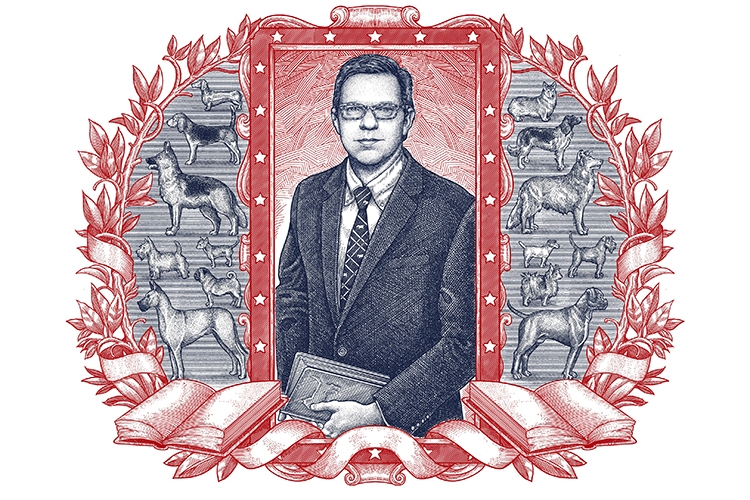Illustration by Philip Harris
You might be reading this with your trusty companion at your feet. If you wrote a story about her, what would it say?
Throughout history, authors have written narratives that feature — or allude to — the dogs at their side. With the literary anthology In Dogs We Trust (The University of South Carolina Press, 2019), Jeffrey Makala ’94, a special collections librarian and archivist at Furman University, aims to bring those lesser-known stories and poems to a wider audience.
Five years ago, Makala’s eventual co-editor, Jacob F. Rivers III, had just compiled a volume of sporting dog narratives, which inspired their idea for a broader set of historic dog literature. In Dogs We Trust is the result; broken into sections it includes: working dogs, sporting dogs, companion dogs, and poetry about dogs. With works spanning several centuries, each section contains American literature about dogs from a variety of genres. The subject matter is more broad, ranging from a Meriwether Lewis journal entry about being saved from a buffalo by his dog to an Emily Dickinson poem about her Newfoundland confidant, Carlo.
Scouring magazine literature, popular newspapers, microfilm, reprinted books, and databases, Makala and Rivers found stories of canines from popular authors like Harriet Beecher Stowe as well as ordinary people with a love for man’s best friend. One of Makala’s favorites is Tumbler’s Epitaph, a one-page broadside sourced from 1840s upstate New York. Two known copies exist. “It’s a heartfelt celebration of this dog’s life that his owner went to the trouble of having it printed up and then distributed to Tumbler’s friends. And they all, like the poem says, probably raised a glass to him at some point.”
When Makala and Rivers narrowed down their selections, some authors had to be viewed through a more thoughtful lens. Early 20th-century journalist Albert Payson Terhune penned the widely read adventures of his collie, Lad, but many of them included anti-immigrant sentiments. “If you look at dog literature in America, you look at American literature,” Makala says. “The themes, problems, and national challenges that arise in every other aspect of American life and culture were reflected in literature as a whole, but also in dog literature.” Because Terhune’s work was so prolific in his day, they compromised by including two of Terhune’s less-problematic stories.
Makala became entranced with special collections while working as a program assistant in Colgate’s peace and conflict studies program following graduation. After several long conversations with University librarians about rare books, he took their advice and attended the University of Illinois, where he narrowed his scope to rare books and archives related to colonial and 19th-century American literature. Though his title is special collections librarian and archivist, Makala considers himself a literary historian because he takes on several projects in that realm.
The book is dedicated to Maggie, Makala’s energetic West Highland white terrier, and Murray, the Scottish terrier who was by Makala’s side throughout his PhD program. “They are our constant companions and our writing companions, our source of inspiration.”

